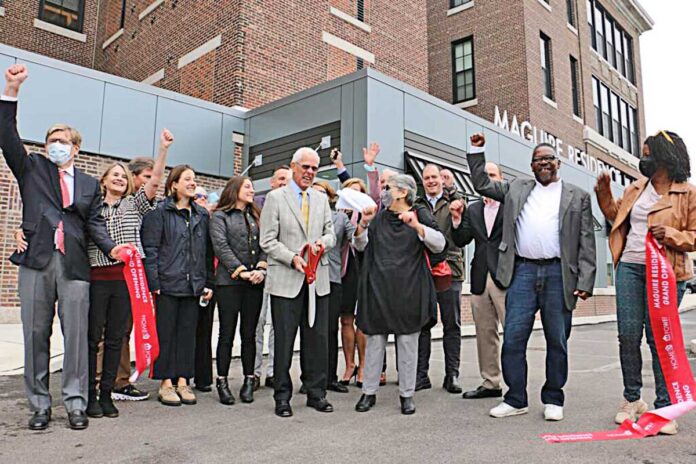
In late October, a ribbon was cut at the newly constructed Maguire Residence in Kensington, a housing facility for people who previously experienced homelessness. The 42-unit apartment complex has been completely full for a year, with a waiting list.
The grand opening of the building was delayed for over a year. It’s developer, Project HOME, had finished construction and moved people in during the pandemic, despite a moratorium imposed on all construction projects for several months during the initial shutdown of 2020.
“We got an exemption because we were further along in our construction, and it was for people who experienced homelessness and during COVID,” said Project HOME co-founder Sister Mary Scullion. “People couldn’t stay at home — they didn’t have a home to go to. Since we were building a home, they let us complete it so people could move in and have a home.”
Harrison Womack, 64, was one of the first to move into Maguire last year. He had been living in Project HOME’s Hope Haven in Strawberry Mansion, where for more than four years he had a bedroom in a shared house. All that time he was on a waitlist to get into his own apartment.
“I feel great about this, you know, I finally got a spot where I don’t have to share a bathroom or share a kitchen with anyone else,” said Womack. “It’s independent living. I do my own shopping, my own cleaning, everything. It’s subsidized housing. You don’t pay the full amount of rent. You only pay what our income will allow us to pay.”
For rent, tenants of Maguire Residence pay 30% of whatever income they bring in. It’s also supportive housing, meaning Project HOME offers social services to its residents, such as health care, behavioral health support, vocational training, education, and community advocacy.
Womack says he does not utilize those additional services. When he was living in the shared house, he worked for Project HOME assisting other tenants and people staying in shelters. Since the pandemic, those kinds of direct-contact services are less used, so Womack said he retired.
He still helps his fellow Maguire tenants, only now as a volunteer.
“I’m not retired at all now. I am the number one volunteer,” he said.
Project HOME operates numerous homeless shelters in the city that invite people to come in off the street, as an transitional step. Those who are able to handle the responsibilities of renting a unit of their own are able to apply to one of Project HOME’s 976 permanent units.
“As people begin to work and get back on their feet, many people get income and they can afford a place on their own, if that’s what they want to do and move forward with their life,” said Scullion. “Some people, especially maybe people who are elderly or have serious behavioral health problems, stay here for very long periods of time.”
The Maguire Residence was built with the financial help of MPOWER, a network of philanthropists led by Leigh and John Middleton, which, over the last decade, has supported housing projects for people experiencing homelessness.
“Leigh and John and others recognize that it’s not simply about giving a person a house, but access to quality health care, including behavioral health care,” said Scullion. “Access to employment and education are equally important and strategic to truly break the cycle of homelessness and poverty.”
Maguire Residence is the seventh subsidized supportive housing project developed by Project HOME, in partnership with MPOWER. They have a goal of developing 1,000 supportive housing units for people experiencing homelessness. Achievement of that goal is imminent: Project HOME now has 976 units occupied, with another 62 under construction.
This story originally appeared in WHYY.

